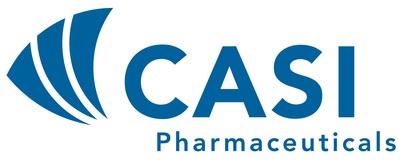BEIJING, Feb. 16, 2024 /PRNewswire/ -- CASI Pharmaceuticals, Inc. (Nasdaq: CASI), a biopharmaceutical company specializing in the development and commercialization of innovative therapeutic and pharmaceutical products, proudly announced the administration of the first dose of FOLOTYN® (Pralatrexate Injection) to a patient in China. This remarks a pivotal step in CASI's commitment to addressing critical medical needs in peripheral T-cell lymphoma in China market.

FOLOTYN® (Pralatrexate) is a dihydrofolate reductase inhibitor indicated for the treatment of patients with relapsed or refractory peripheral T-cell lymphoma ("PTCL"). Compared with methotrexate, pralatrexate could be more effectively internalized into tumor cells which may translate to a greater anti-cancer effect. Clinical studies have demonstrated that pralatrexate has significant activity against PTCL1. With the results of an overall response rate ("ORR") of 52% and a median progression-free survival ("PFS") of 4.8 months from the Chinese registrational study2, in comparison to an ORR of 29% and a median PFS of 3.5 months from the PROPEL study3 in the US. Pralatrexate was approved in the United States, Japan and China as treatment for PTCL. Pralatrexate is a promising treatment option for Chinese patients with relapsed or refractory PTCL.
Dr. Wei-Wu He, CEO of CASI, expressed his enthusiasm for this milestone, "The dosing of the first patient with FOLOTYN® in China marks a significant achievement for CASI. It reflects our unwavering commitment to bringing advanced therapeutic options to patients, particularly in therapeutic areas with substantial unmet medical needs. This is a proud moment for our team and a step forward in our mission to transform patient care through innovation."
About CASI Pharmaceuticals
CASI Pharmaceuticals, Inc. is a biopharmaceutical company focused on developing and commercializing innovative therapeutics and pharmaceutical products in China, the United States, and throughout the world. The Company is focused on acquiring, developing, and commercializing products that augment its hematology oncology therapeutic focus as well as other areas of unmet medical need. The Company intends to execute its plan to become a leader by launching medicines in the Greater China market, leveraging the Company's China-based regulatory and commercial competencies and its global drug development expertise. The Company's operations in China are conducted through its wholly owned subsidiary, CASI Pharmaceuticals (China) Co., Ltd., located in Beijing, China. More information on CASI is available at www.casipharmaceuticals.com.
Forward-Looking Statements
This announcement contains forward-looking statements. These statements are made under the "safe harbor" provisions of the U.S. Private Securities Litigation Reform Act of 1995. These forward-looking statements can be identified by terminology such as "will," "expects," "anticipates," "future," "intends," "plans," "believes," "estimates," "confident" and similar statements. Among other things, the business outlook and quotations from management in this announcement, as well as the Company's strategic and operational plans, contain forward-looking statements. The Company may also make written or oral forward-looking statements in its periodic reports to the U.S. Securities and Exchange Commission (the "SEC"), in in its annual report to shareholders, in press releases and other written materials and in oral statements made by its officers, directors or employees to third parties. Statements that are not historical facts, including statements about the Company's beliefs and expectations, are forward-looking statements. Forward-looking statements involve inherent risks and uncertainties. A number of factors could cause actual results to differ materially from those contained in any forward-looking statement, including but not limited to the following: the risk that we may be unable to continue as a going concern as a result of our inability to raise sufficient capital for our operational needs; the possibility that we may be delisted from trading on The Nasdaq Capital Market if we fail to satisfy applicable continued listing standards; the volatility in the market price of our ordinary shares; the risk of substantial dilution of existing shareholders in future share issuances; the difficulty of executing our business strategy on a global basis including China; our inability to enter into strategic partnerships for the development, commercialization, manufacturing and distribution of our proposed product candidates or future candidates; legal or regulatory developments in China that adversely affect our ability to operate in China, our lack of experience in manufacturing products and uncertainty about our resources and capabilities to do so on a clinical or commercial scale; risks relating to the commercialization, if any, of our products and proposed products (such as marketing, safety, regulatory, patent, product liability, supply, competition and other risks); our inability to predict when or if our product candidates will be approved for marketing by the U.S. Food and Drug Administration, European Medicines Agency, PRC National Medical Products Administration, or other regulatory authorities; our inability to enter into strategic partnerships for the development, commercialization, manufacturing and distribution of our proposed product candidates or future candidates; the risks relating to the need for additional capital and the uncertainty of securing additional funding on favorable terms; the risks associated with our product candidates, and the risks associated with our other early-stage products under development; the risk that result in preclinical and clinical models are not necessarily indicative of clinical results; uncertainties relating to preclinical and clinical trials, including delays to the commencement of such trials; our ability to protect our intellectual property rights; the lack of success in the clinical development of any of our products; and our dependence on third parties; the risks related to our dependence on Juventas to conduct the clinical development of CNCT19 and to partner with us to co-market CNCT19; risks related to our dependence on Juventas to ensure the patent protection and prosecution for CNCT19; risks relating to the commercialization, if any, of our proposed products (such as marketing, safety, regulatory, patent, product liability, supply, competition and other risks); risks relating to interests of our largest shareholder and our Chairman and CEO that differ from our other shareholders; and risks related to the development of a new manufacturing facility by CASI Pharmaceuticals (Wuxi) Co., Ltd. Further information regarding these and other risks is included in the Company's filings with the SEC. All information provided herein is as of the date of this announcement, and the Company undertakes no obligation to update any forward-looking statement, except as required under applicable law.
FOLOTYN® is proprietary to Acrotech Biopharma Inc and its affiliates.
Reference
1. Casanova, M., et al. Critical appraisal of pralatrexate in the management of difficult-to-treat peripheral T cell lymphoma. Ther Clin Risk Manag. 2011; 7: 401–408.
2. Hong X., et al. Pralatrexate in Chinese Patients with Relapsed or Refractory Peripheral T-cell Lymphoma: A Singlearm, Multicenter Study. Target Oncol. 2019 Apr;14(2):149-158.
3. O'Connor OA, et al. Pralatrexate in patients with relapsed or refractory peripheral T-cell lymphoma: results from the pivotal PROPEL study. J Clin Oncol, 2011, 29(9):1182-1189.
COMPANY CONTACT:
Rui Zhang
CASI Pharmaceuticals, Inc.
240.864.2643
ir@casipharmaceuticals.com
www.casipharmaceuticals.com
 View original content to download multimedia:https://www.prnewswire.com/news-releases/casi-pharmaceuticals-announces-first-dosing-of-folotyn-in-china-302063676.html
View original content to download multimedia:https://www.prnewswire.com/news-releases/casi-pharmaceuticals-announces-first-dosing-of-folotyn-in-china-302063676.html
SOURCE CASI Pharmaceuticals
![]() View original content to download multimedia:https://www.prnewswire.com/news-releases/casi-pharmaceuticals-announces-first-dosing-of-folotyn-in-china-302063676.html
View original content to download multimedia:https://www.prnewswire.com/news-releases/casi-pharmaceuticals-announces-first-dosing-of-folotyn-in-china-302063676.html







